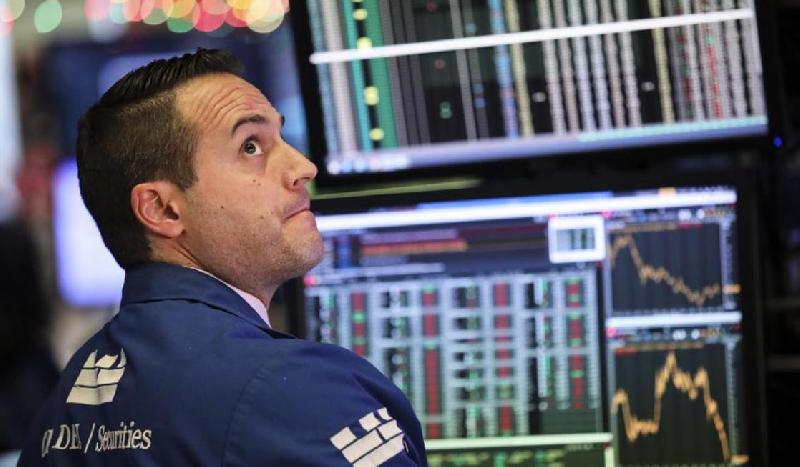
Global stock markets dropped on Thursday as investors reacted to the U.S. Federal Reserve's latest interest-rate hike and forecast of future tightening path.
Japan's Nikkei 225 index ended 2.8 percent lower, leading the decline in Asia. In Europe, France's CAC 40 index fell 1.5 percent, Germany's DAX index dropped 1 percent, and Britain's FTSE 100 closed down by a more modest 0.4 percent.
The global market turmoil came after the Fed decision on Wednesday to raise the U.S. federal funds rate by a quarter of a percentage point, to a range of 2.25 to 2.5 percent. The Fed also signaled a slower pace of rate hikes next year as the U.S. economy is expected to cool down.
In the wake of the Fed announcement, U.S. stocks declined sharply on Wednesday, with both the Dow Jones Industrial Average and the Standard & Poor's 500 index falling about 1.5 percent. The U.S. stocks extended losses on Thursday, with Dow down 2 percent to a 14-month low.
"The Federal Reserve hiked rates as expected at December's meeting while delivering a more hawkish message than Wall Street was hoping for," Tim Duy, a veteran Fed watcher and economics professor at the University of Oregon, wrote in a blog post on Thursday.
Duy said this rate hike was "more likely a mistake," and appears to be "an overly mechanical reaction" to the model outcomes.
"It makes no sense to create the impression of a promise to continue to raise interest rates at a mature point in the business cycle when growth is already slowing," he argued.
The Fed expected the U.S. economy to grow at 3 percent this year, a bit lower than 3.1 percent estimated in September, according to its latest economic projections released on Wednesday. It also revised down forecast for U.S. economic growth in 2019 to 2.3 percent from the previous 2.5 percent.
With an expected slowdown in the U.S. economy, Fed officials envisioned two rate hikes next year, down from three estimated in September, according to its median forecast.
Some analysts also believe that there is a disparity of views between the central bank and investors on the softening in global economic growth.
When asked about how he perceived the market, Fed Chairman Jerome Powell on Wednesday told a press conference that Fed officials would look for material changes in financial conditions as market volatility doesn't necessarily result in major economic impact.
"We follow markets really carefully but remember, from a macroeconomic standpoint, no one market is the single dominant indicator," Powell said.
The Wednesday decision marked the Fed's fourth rate hike this year and the ninth since late 2015, as the U.S. central bank moves forward on the path of monetary policy normalization.
"I think it's a good idea to bring interest rates to the level that we are at now or maybe another half a percentage point higher. I think that should be a good level," Mauro Guillen, a management professor at the Wharton School of University of Pennsylvania, told Xinhua.
Guillen said he thinks it's necessary to communicate to everyone that "money has a cost," because for the past several years since the recession, the price of borrowing has been "too low," which runs the risk of creating bubbles.
Over the past year, the Fed's rate hikes have also tightened global financial conditions and brought spillover effects for emerging markets, some of which have faced strong pressure in capital outflows and currency devaluations.
"Some vulnerable emerging market economies have come under strain as the U.S. dollar gained value and the level of risk that global financial investors were prepared to accept dropped," said economists from the International Monetary Fund (IMF) in a blog post on Thursday.
"Most of these countries have seen increases in their external borrowing costs, but the extent of these increases varied widely," the IMF economists said, noting that Argentina and Turkey are among the emerging markets worst hit by higher borrowing costs over the past year.
As for the Fed's latest rate hike, experts believe that the impact on emerging economies also varies.
Guillen told Xinhua that emerging markets that export commodities and borrow in U.S. dollars, such as Argentina and Brazil, would be negatively impacted, while the exporters of manufactured goods, such as China, would be better off.
Some analysts believe that the Fed's latest rate projections could be a soothing message for emerging markets, as the Fed is getting closer to the end of its rate hiking cycle.
"Its new projection of two rate hikes next year, one less than it previously indicated, will come as a relief for Asian monetary authorities who spent the best part of 2018 trying to prop up their currencies," the Nikkei Asian Review said in an article Thursday.
Some expect to see improving economic conditions in emerging markets in the days ahead. "I guess if we go into next year, we would see many emerging market currencies in particular, many of which have underperformed significantly in 2018, having a bounce back," Andrew Wilson, the CEO for EMEA and global head of fixed income at Goldman Sachs Asset Management told CNBC on Tuesday.
There are already signs of a bounce back. Data from the Institute of International Finance has shown that foreign portfolio inflows to emerging markets jumped to 33.9 billion dollars in November, the best month since January, following a weak six-month stretch.


















Latest comments